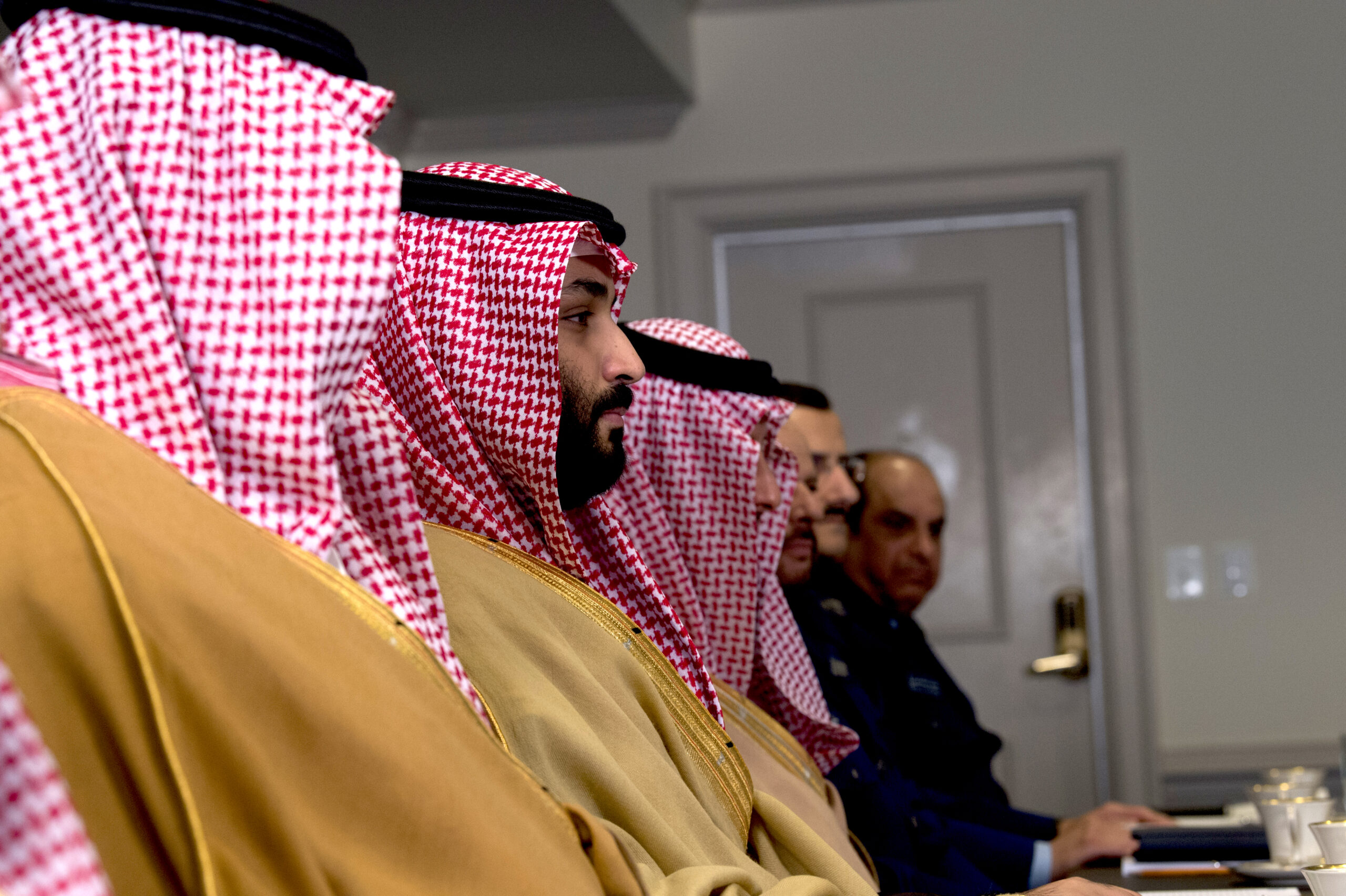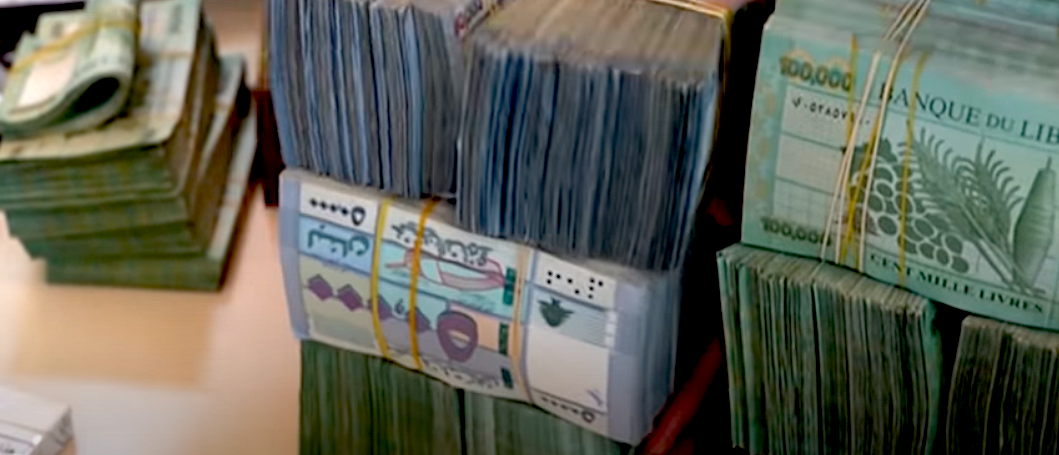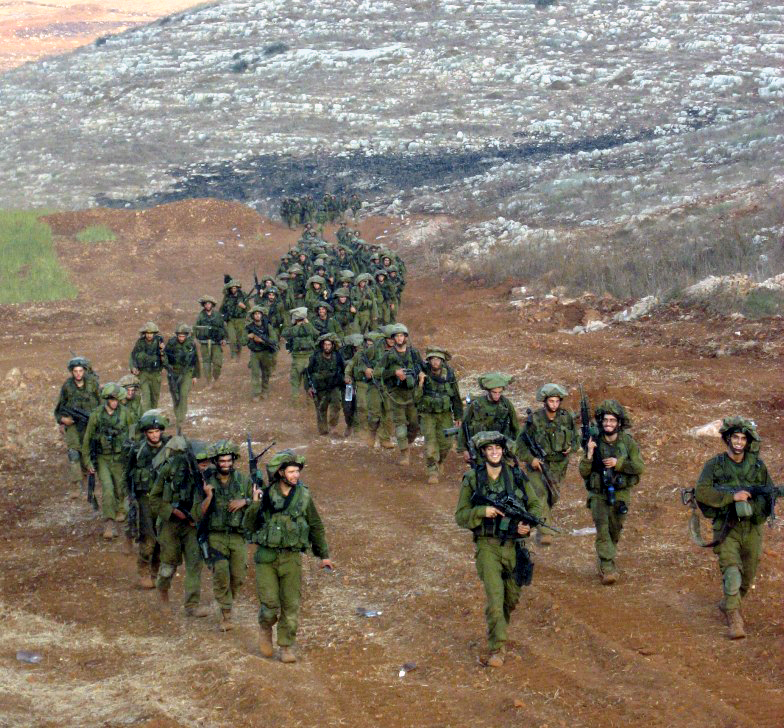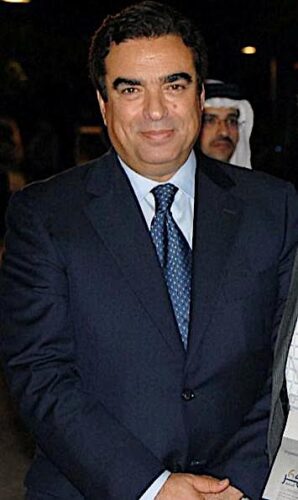The Saudi-UAE alliance wants to protect the Israeli flank from a powerful resistance movement with regional extensions, writes As`ad AbuKhalil.

Saudi Crown Prince Mohammed bin Salman, MbS, at the Pentagon in Washington, D.C, in 2018. (DoD, Kathryn E. Holm)
By As`ad AbuKhalil
Special to Consortium News
 Lebanon is not well, and has not been well for the last two years. The economic collapse of 2019 altered the political and economic landscape of the country.
Lebanon is not well, and has not been well for the last two years. The economic collapse of 2019 altered the political and economic landscape of the country.
While the country has proved its resilience (largely because Western governments have a stake in the system and sponsor most of the political bosses and the heads of armed services and security services), Lebanese society is no longer recognizable. The evaporation of bank deposits, and the devaluation of the Lebanese pound caused drastic shifts in class locations.
Some rich people who trusted the banks blindly were pushed to middle class status, while people in the middle class joined the ranks of the working class or the poor. The poor did not lose money in the banks, but living conditions in Lebanon are harder than ever and basic living necessities are more expensive than they have ever been.
People stand in line at the banks to receive whatever arbitrary and meager cash amounts the banks allow, and at a great loss to depositors. Remittances from the Gulf, Africa and the West help many families but close to half of the population live in abject poverty.

Bundles of lebanese pounds, September 2021. (Titsor8976, CC BY-SA 4.0, Wikimedia Commons)
Lebanon does not have social programs because the assassinated Lebanese-Saudi Prime Minister Rafiq Hariri (who designed the economic system responsible for the collapse) was a firm believer in total privatization; he once advised the poor to fix their shoes instead of buying new ones.
But the latest crisis in Lebanon is political in nature, grounded in Lebanese-Saudi relations. Ever since Hariri’s murder in 2005, the powerful Saudi regime has been trying to control Lebanon. It has not been a smooth course of domination.
Origins in 2006 War
The current crisis (explained below) can be traced to the July war of 2006 against Israel. As soon as the war erupted, the Saudis issued a statement (simply attributed to officials) in which the regime blamed the war on Hizbullah.
It became the first real (official) Saudi break from the Palestine problem. To be sure, the covert relationship between the Saudi royal family and Israel goes all the way back to the 1960s when both worked against Gamal `Abdul-Nasser in Yemen.
But it was after 2001 that the royal family calculated that it could only erase the damage of Sept. 11 by getting closer to Israel.
The Saudis launched an unprecedented, regional, sectarian war against Shiites in order to undermine the pan-Arab support for Hizbullah. The campaign was rather successful, aided by Hizbullah’s own shortcomings and its participation in the Syrian war on the side of Damascus.
But the 2006 war did not end as it was planned by Israel and the U.S., and wished for by the Saudi and UAE royal families. The Economist magazine called the result of the war a “draw” but it was really the worst humiliation suffered by Israel since 1948.
In 1973, Arab armies launched the October war and made serious advances against Israeli positions, but Israel — with unprecedented U.S. aid and an airlift —managed to regroup and push back against the Syrian and Egyptian armies.
In 2006, the Israeli army could not advance one inch in South Lebanon. The U.S. allowed Israel to use as much lethal force as it needed, and gave it as much time as it needed to finish the job. But the job could not be finished. Not unrealistically, the Lebanese considered it a great victory (Hizbullah declared it a “divine victory”).

Israeli soldiers leaving Lebanon, Aug. 1, 2006. (IDF, CC BY-SA 3.0, Wikimedia Commons)
But the Saudi regime did not give up; it declared Hizbullah a terrorist organization and used its massive media empire to demonize Hizbullah and Hamas and all those who dare fight and resist Israel. It also banned Hizbullah’s Al-Manar station from the two Arab satellite carriers.
In May 2008, the Saudis tried another tactic against Hizbullah: it armed poor Sunnis from Tripoli and Akkar and spread them under the guise of “security companies” all around Beirut and the north. They were supposed to take on Hizbullah forces, which even the Israeli army could not defeat.
The pro-Saudi Lebanese government tried in May 2008 to ban Hizbullah’s tele-communication network, which is essential for its ability to operate without Israeli interceptions. The events of that day were rather swift: those who were paid by the Saudi regime (and managed by the Hariri family in Lebanon) were quickly subdued and disarmed, and other clashes occurred between Hizbullah fighters and fighters of Druze sectarian warlord Walid Jumblat. It was another failure of Saudi policies, and Hizbullah wound up expanding its political power in Lebanon.
But the rise of Muhammad Bin Salman in 2015 (first as minister of defense, then as crown prince and later as the actual ruler when his father, Salman, ascended the throne) accelerated the war on Hizbullah and on all allies of Iran in the region. Bin Salman (MbS) wanted his allies in Lebanon to take on Hizbullah and remove it from the government (although Hizbullah is the most powerful political party in Lebanon and managed to receive the largest number of votes in the last election).
Saudi ally, Prime Minister Saad Hariri, Rafiq’s son, did not express unwillingness, but rather inability to carry out the task.
In November 2017, Hariri was summoned to Saudi Arabia where he was quickly separated from his security detail and ordered strapped to a chair and beaten. The prime minister of Lebanon — the highest Sunni office older in government—became a hostage of Muhammad bin Salman.
He was later that evening ordered to read a resignation statement that was intended to ignite a civil-sectarian war. The statement accused Hizbullah of trying to kill him and condemned Iran’s expertise of “destruction and chaos.” The plan failed and Hariri’s Sunni supporters in Lebanon rallied behind him. The Lebanese president refused to accept the prime minister’s resignation. Hariri was subsequently released under French diplomatic pressure.
The Latest Crisis

George Kurdahi in 2007, during his time as a TV presenter. (Ahmed Zayer, CC BY 2.0, Wikimedia Commons)
The most recent crisis is straight forward. New Lebanese Minister of Information George Kordahi appeared before the formation of the new cabinet on Aljazeera at the end of October and condemned the war on Yemen, referring to it as “pointless.” Kordahi had become a regional celebrity after hosting the Arabic version of “Who Wants to Be a Millionaire.” He has a history of praising Arab despots (from Syria’s Bashshar al-Assad to Gulf leaders and Gen. Abdel Fattah el-Sisi of Egypt).
After the war in Syria erupted in 2011, Kordahi (who is close to Lebanese politician Sulayman Franjiyyah — a personal friend of Syria’s ruler), supported the Syrian regime and was fired from MBC Television. (MBC is the biggest Arab television conglomerate and is owned by affiliates of the Saudi royal family).
As soon as Aljazeera aired Kordahi’s remarks on Oct. 25 a diplomatic crisis ensued.
Saudi Arabia and its Gulf allies withdrew their ambassadors from Lebanon and expelled Lebanese ambassadors from their capitals; they also banned Lebanese imports. And like in every crisis of this kind, Saudi media began threatening to expel Lebanese expatriates from the Gulf.
Unsurprisingly, most politicians, journalists and NGOs in Lebanon sided with the Saudi government. They stood against freedom of speech. The Saudi and UAE governments wanted to impose an official ban on freedom of speech in Lebanon — though freely allowing criticism of Iran and its allies in Lebanon.
Lebanon, despite its problems and its economic demise, remains one of the few Arab countries in which criticism of the Saudi and UAE regimes can be made. But the oil and gas monarchs have corrupted the Arab cultural sphere to such an extent that one sees journalists, writers and artists supporting the Saudi-UAE campaign to suppress freedom of speech in Lebanon.
The crisis has not been resolved. The Saudi government insists on the resignation of Kordahi, but he refuses and stands by his position. Western governments intervened with the Saudis to no avail.
The Saudi-UAE axis wants to dominate the entire Arab world and to ban all criticisms of their Yemen war and their alliance with Israel. The alliance with Israel requires a reconfiguration of the Arab state system in order to prohibit the rise of a rival camp—no matter how small.
Lebanon remains an anomaly in Arab politics because its diversity —and its internal conflicts — prevent the imposition of one point of view, as is the case in all Arab countries. Furthermore, the Saudi-UAE alliance wants to protect the Israeli flank from a powerful resistance movement with regional extensions.
This crisis is not likely to be resolved quickly and Saudi demands of Lebanon are as cumbersome and divisive as were the conditions for reconciliation with Qatar after the 2017 crisis. Eventually under pressure from the U.S., both the Saudi and UAE regimes dropped all their previous conditions and restored relations with Qatar.
Lebanon is in a weak state; its economy has collapsed and its people are desperate for salvation from any source. But Saudi Arabia is not promising any rewards or aid to Lebanon. Far from it; they are brazenly asking for submission and surrender in return for the restoration of diplomatic relations.
Some people in Lebanon refuse to submit, no matter how heavy the pressures are from the Gulf.
As`ad AbuKhalil is a Lebanese-American professor of political science at California State University, Stanislaus. He is the author of the Historical Dictionary of Lebanon (1998), Bin Laden, Islam and America’s New War on Terrorism (2002) and The Battle for Saudi Arabia (2004). He tweets as @asadabukhalil
The views expressed are solely those of the author and may or may not reflect those of Consortium News.

Mr. Abulkhalil says Hizbullah’s participation in the Syrian war aided Saudi sponsored sectarian war against Shiites; I think actually it did the exact opposite. Hizbullah’s participation in the Syrian war was instrumental in the defeat of one of the most dangerous sectarian war ever launched in the West Asia-mainly by the Saudis and its allies. As the Saudis and its allies are opening up to negotiations with the Iranians and the Syrians, they realise the failure of their destructive strategy.
It is time for those whom the hatred of the Syrian government has blocked their vision on Syrian civil war, to revisit the events that has taken place in that country.
Lebanon,stand up for your rights. Yes the situation could be too difficult but,that is life as it’s supposed to be so long as you live.What is the use of the assistance from Saudi/UAE if it’s meant to subdue them or take away the freedoms they’ve enjoyed as Lebanese that have allowed them to be what they are? Remember,once they give in to that blackmail by the Saudis and the UAE,they will have lost not only their freedoms and rights but the sovereignty of their country.
So both KSA and USA sold out to Israel and fund genocides for personal gain of politicians. A monarchy and a fake democracy are both plutocracies for sale. But only the US knowingly funds foreign bribes to its own politicians. Surprising that Russia and China don’t bribe US politicians; it must be far cheaper than superpower weapons and sanctions, and would probably do us a lot of good. But then maybe they do, and the warmongering just conceals the corruption. So long as the bribes are bipartisan, the DOJ/FBI/HSI will not investigate.
Paradise lost and of course, the US and its major Middle East allies, Israel, Saudi Arabia and the other monarchical dictatorships, are fully to blame. But let’s blame Hezbollah instead, and Iran, they dare to provide social services to the most destitute and that is obviously anti-American.
Assad may be you are right in many thinks , but not about your depiction of Assad , thank to him Syria still is a whole , besides all the foreigners interested in divide it , thanks to him we are not Irak , neither Libia
Saudi Arabia has long been a close ally of politicians in Lebanon’s Sunni Muslim community, which chooses the prime minister under the country’s sectarian system. But the kingdom never forged the divided community into a strong political proxy the way the Shiite Hezbollah — with its powerful armed force — became Iran’s stalwart ally in Lebanon.
all ngo need be thrown out. thanks
Any country that values its sovereignty should expell western NGOs.